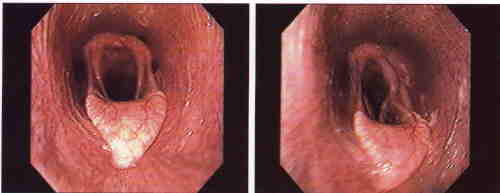Roarers and Laryngeal Hemiplegia in Horses and Equines
by Robert N. Oglesby DVM
Introduction
Introduction
»
Clinical Signs
»
The Cause
»
Diagnosis
»
Treatment and Prognosis
»
More Info & Discussions
A frequent problem with horses is respiratory noise during exercise somtimes associated with decreased performance. Among the possible causes are: dorsal displacement of the soft palate, collapse of the pharyngeal walls, and laryngeal hemiparesis.

Mild paralysis on the left, severe on the right.
The larynx is a cartilaginous box located at the back of the throat that leads to the trachea (windpipe). It is responsible for keeping food out of the trachea while swallowing and is involved with vocalization. Laryngeal hemiparesis (LH) is where one of the two flaps responsible for opening and closing the trachea becomes weak, or even paralyzed. This leaves the flap stuck in a partially of completely closed position.
At rest there is plenty of room for air to get through. As the horse's exercise level goes up he reaches a point where the flap impedes breathing. This is the cause of the noise and if severe, exercise intolerance. The degree of paralysis is variable and some horses have noise without exercise intolerance.
This article concerns itself with the cause, diagnosis, treatment options, and prognosis of laryngeal hemiparsis. If you are uncertain as to the cause of your horses respiratory noise start with the article on differentiating the various causes of abnormal respiratory noise in horses
Respiratory Noise.
Clinical Signs
Introduction
»
Clinical Signs
»
The Cause
»
Diagnosis
»
Treatment and Prognosis
»
More Info & Discussions
Noise during exercise is the most common sign and is called roaring. Exercise intolerance may be obvious in severe cases but in many cases the degree of exercise impairment is unclear.
The Cause
Introduction
»
Clinical Signs
»
The Cause
»
Diagnosis
»
Treatment and Prognosis
»
More Info & Discussions
To read more on this topic become a member of
Horseadvice.com! Your membership gets you instant access to this and over 600 equine articles on our site. Other benefits of your membership include participation in our discussion boards and access to our one button PubMed search tool for each topic.
Horseadvice.com educates you to be a more knowledgeable horse owner which leads to healthier horses and save you money, we guarantee it. Come Join Us! Mild paralysis on the left, severe on the right.
Mild paralysis on the left, severe on the right.